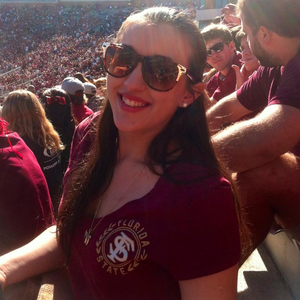Closing in on 30, Kiran Shrestha has seen a lot in his time as an adult. He entered the military as a teenager and came out as a man living for himself. He is now an aspiring bodybuilder with an ample amount of knowledge to share. And, as one of my great friends, he allowed us to interview him regarding his amazing diet and body transformation over the last 13 years.
Spoon: What was your diet like before the military?
Kiran: So, in high school, I was a very picky eater, which didn’t do me any favors because I didn’t limit my intake to just a few things. I mostly ate junk food. I lived off of Red Baron pizza, A&W root beer, hot dogs, and chips. I didn’t drink a lot of water, either.
Spoon: How much did you weigh pre-military?
KS: I was pretty active, so I would say I was 160lbs, 6’2. Pretty average lanky black kid with an afro. Yeah. But, I had a sh*t diet and didn’t know anything about health or nutrition.
Spoon: And then immediately after high school?
KS: Straight into the military. In the military, there was a huge emphasis on consuming large amounts of water because heat injuries were a big deal. As far as food, you ate what you could get your hands on as fast as possible. But if we were out in the field, meals came as MRE’s, which are designed to give you the calories you need to keep going. They’re not really flavor-based.
Spoon: Are the MRE’s nutrient based, like protein-carb-vegetable?
KS: Yes. Ideally you get 3 a day. More often than not, you’ll get at least one hot meal a day. That’s in the field. When you’re not in the field, you got your meals at the dining facility. They did give options. You could eat healthy food – chicken, greens, corn, and cornbread. Or, you could get what they like to call “fat pills” which is junk food. They had corn dogs, pizza, hamburgers and stuff like that. So, you had a choice, but if you went and got your “fat pills” a drill sergeant was watching and then he’d make it a point to make you pay – let’s go run a mile and do lunges. They’ll make you quickly realize that a corn dog isn’t worth throwing up after they destroy you.
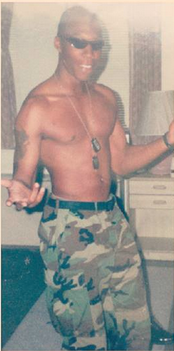
Photo courtesy of Kiran Shrestha
Spoon: What do you think your daily caloric intake and output was?
KS: I would say intake probably couldn’t have been more than 3000 calories a day. Output was probably twice that.
Spoon: Was it enough food or were you constantly hungry due to your output?
KS: Because I was stressed the f*ck out, I didn’t have time to think about it. Thoughts were more like, “please don’t make me do more pushups.” Food didn’t come to mind.
Spoon: After basic training you went to Advanced Invidual Training. What were meals like during AIT?
KS: Because it was more liberal than basic, you had more freedom. You could go to the on-base food court. And they had little establishments similar to gas stations where you could buy your basic stuff like random gear and twizzlers. For the most part I kept it simple. I was 19, so pizza wasn’t gonna kill me, fries weren’t gonna kill me, I wasn’t gonna get fat. I think I’m up to 170lbs at this point, and it’s mostly muscle.
Spoon: Physical output and intake?
KS: Output was a little bit less than basic training because it’s more about training the mind rather than the body. You’re still gonna do physical training, but it’s not day in day out grueling intense exercise. It’s more like a very involved semi-intense college atmosphere.
Spoon: So did you have to go somewhere to get your food?
KS: Yeah. No kitchens in the dorms. The food was kind of up to you. I was also allowed to go off base at this point. Anything is better than an MRE. If I had the option, I’d save those only for the zombie apocalypse.
Spoon: If you didn’t go off campus for food, where did you eat?
KS: The dining facility. Every base has one. They gave you really well-rounded meals. I couldn’t really complain, but Airborne school is elective training. You didn’t have to do it.
Spoon: After AIT you landed at your first duty station. Tell us about the food there?
KS: Basically, back to dining facilities and a lot of Papa John’s. Keeping it simple. And before I knew it, I was on a flight to Kuwait. So, going to Iraq was a particularly significant change, especially since I got there in the middle of the summer. It was around 120 degrees on average. It’s like someone blowing a hair dryer on you all f*cking day.
Spoon: Were you on a base when you first got there?
KS: Yeah. I was just outside a small city called Tal Afar. It was an old Iraqi air base that we converted into our base. And the dining facility over there actually wasn’t that bad.
Spoon: Was it the same food you ate in the United States bases or did they try to integrate some of the surrounding culture into the cuisine?
KS: Uh, aside from the basics, they were really big on serving Chinese food, oddly enough.
Spoon: Are we talking mall cafeteria Chinese?
KS: Yeah, like Panda Express type food. I don’t know why or how. All I remember is they used to have these bomb a** egg rolls and they were practically the size of a Chipotle burrito. And I used to eat the sh*t outta those things. I mean, it was all the same thing. You could get your lo mein and egg rolls. When I was deployed, I could eat there as many times during the day as I wanted. If you were stuck over there for the holidays, they did make an effort to give you a nicer meal. For Christmas, they would do a big thing with steaks and crab, and non-alcoholic beer.
Spoon: When you were still in the U.S. and you could go off base, could you go out and have a couple of drinks?
KS: I was underage, but yes. As crazy as it sounds, we were all very responsible with it. Being in the military during training is like living with your parents who have no sense of humor.
Spoon: Tell me more about your food consumption in Iraq.
K: It wasn’t that great, primarily because of care packages people send. You know, the shove a whole f*cking bunch of candy into the box. And that’s great for people who go out into the field for weeks on end, only eating MRE’s, and they’ll take the boxes with them. Just so much f*cking candy. Regardless, the diet wasn’t great.
Spoon: What were you doing over there?
KS: I was intel, working with radar systems and a lot of communicating with aircrafts, so I spent a lot of time – 8 hours a day – in the back of a humvee. If it moved fast enough, it would get picked up by the radar of the plane I’m working with, and then I can track it, predict its pattern, keep an eye on it. I was watching all things in northwest Iraq. A lot of responsibility for a 19-year-old. My shift was midnight to 8 am, and then another 4 hours after that.
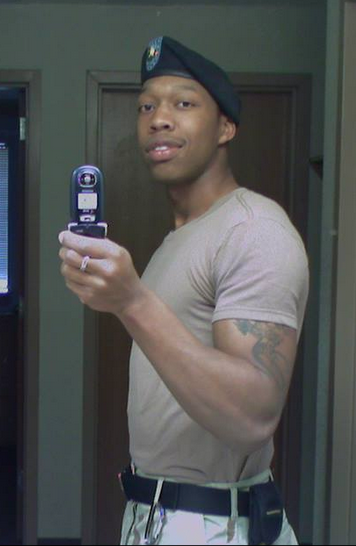
Photo courtesy of Kiran Shrestha
Spoon: How much of your 12 hours required physical output?
KS: Very little. I was sitting there, staring at a screen. Diet was sh*t. I got fat. I went from 173lbs to 182lbs and it was just pokey gut. Sitting in the back of the humvee with a shit ton of twizzlers. It wasn’t action nonstop. It’s not like the movies.
Spoon: In your spare time, did you make any effort to do any physical activity?
KS: Initially, I ordered a bunch of supplements and decided I would go to the on-base gym everyday after work. That lasted for about 2 or 3 weeks until my body was just like, “go to bed, you are tired.” I tried, but the focus wasn’t really on working out. It’s hard to be in the zone, pumping iron, when you’re thousands of miles away from everything. Just too tired and stressed out.
Spoon: Do you think that the environment and stress had an effect on your diet, weight, or physicality?
KS: Absolutely. It’s always stressful, and there isn’t much of a contrast. A difference can be seen when you first get to Iraq and sh*t is blowing up around you and you’re like, “oh, sh*t.” But a month into being there, and things are blowing up around you, you’re then just like, “yeah, it’s Tuesday.”
Spoon: Did you ever eat off base on local shops?
KS: Nope. Everything had to be on base.
Spoon: How long were you there?
KS: I was there for 7 months, and then another month in Kuwait on ship detail, which is pretty much transporting large land vehicles like tanks and humvees onto ships to be taken back to the United States.
Spoon: What happened when you came back to the states?
KS: I was still in my 4-year contract, so I had about 2 years left. I ate Papa John’s, like, everyday. But, this is also when I started to work out at the YMCA off base. I got myself up to 185lbs of muscle and I was good with that. On base, I was doing day-to-day training. And then in late 2006 I met the woman I ended up marrying.
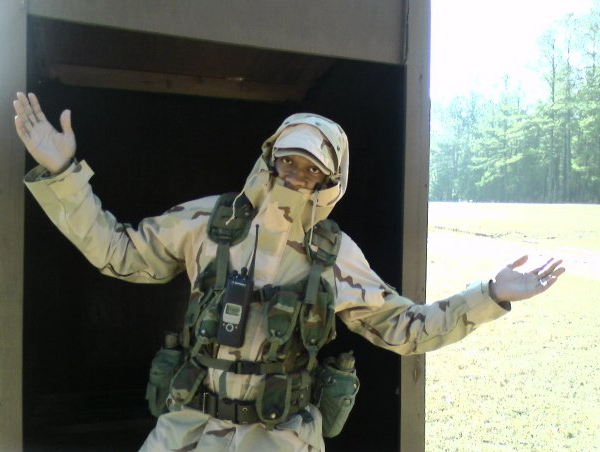
Photo courtesy of Kiran Shrestha
Spoon: How did that pan out?
KS: It ended up leading to a divorce at the end of 2009, going into 2010. And that’s when I was super angry and unpleasant, and I started to work out. I was about 185lbs before that. I went to the gym, making a conscious decision to do something good for myself. I gotta give that to my ex-wife – she made me so angry that I did something to better myself. The gym was therapy.
Spoon: What kind of exercises were you doing?
KS: Free weights, some cardio in a gym. My diet wasn’t anything special. I didn’t know what I was doing. I think I was taking a protein shake after a workout, but that was about it.
Spoon: Did you have a goal in mind?
KS: I wanted to be 225lbs, I wanted to bench 315lbs, and I wanted to look awesome. Seriously. For the first two years after the divorce, I didn’t know what I was doing. My first workouts came from the inside of a protein can. My diet was healthier. I was seeing someone else at the time, and she was Italian, so she cooked a lot of great, hearty food. We moved in together, and everything we ate was at least mildly healthy. Lots of eggs, more fruits. I was never big on eating breakfast before then, but I changed that.
Spoon: And were these lifestyles of hers that you simply adopted, or did you make conscious efforts to change?
KS: I made an effort and then she supplemented it with her cooking, which she was very good at.
Spoon: How often were you in the gym?
KS: 4 or 5 times a week. I’m about 195lbs at this point. Not a whole lot of body fat. Still doing pretty basic workouts. At that time, I also started going to massage school, so I was learning a lot about anatomy and physiology, so I coupled that knowledge with what I was doing in the gym and how I ate. Sh*t ended up not going too well with that girl when we moved to Tampa. Then I moved back to Tallahassee in fall of 2014, and I had a lot more time to focus on my diet.
Spoon: And assuming your son was with your ex wife that whole time, did you have more time to focus on your diet?
KS: At that point, he would have been in kindergarten, so he would have lived with his mom during the school year and with me over breaks and holidays. But since I was alone most of the time, unfortunately, I started to look into more and more concepts and how diet affects the body. I started playing with my diet to figure out what foods would work for me, which were cost effective, and what exactly it is about these foods that is gonna help me build muscle. I switched my workout plans from something light to much heavier stuff. High volume workouts.
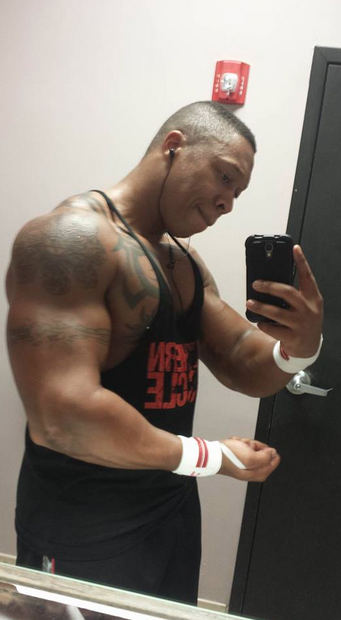
Photo courtesy of Kiran Shrestha
Spoon: How did you track your food intake at this time?
KS: I started by cataloguing what I was already eating. And based off of where I wanted to be, I wasn’t eating enough. What I go by is, basically, take your weight and eat that number in grams of protein. So, if you weigh 160lbs, you should eat at least 160g of protein a day. Now, present day, I’m almost 250lbs, so it sounds daunting to eat 250g of protein. My breakfast now comes out to 40g of protein. It’s 2 extra large eggs, 6 ounces of egg whites, and and greek yogurt. Then, my pre-workout shake and I’m off to the gym. I stay away from cheese, so I get my dairy in that yogurt.
Spoon: Are all of your days in the gym the same?
KS: I always try to increase when and where I can – intesnsity and weight. So when I do that and push myself, there’s going to be a higher caloric output. I have a coach, Lamar Byrd Jr. (@mrchasethepump) who helps me get to where I want to be. He tweaks my diet and workouts where he sees fit.
Spoon: How much do you think you eat?
KS: I consume around 3500 calories a day, on average.
Spoon: Do you eat clean every single day?
KS: I like to have a cheat meal or cheat day once a week. And I eat ~all~ the things when I cheat. I’ll eat my normal breakfast, but then for lunch I’ll go out and eat some ribs, and then a pizza for dinner, and something like a huge ice cream cone for dessert. I don’t do chips. They don’t do it for me. Bring me some f*cking ice cream.
Spoon: What goals do you have for yourself now?
KS: Training to compete in classic physique, which is a style of bodybuilding. Not what you see now with these giant guys who are awesome but huge masses of meat. Classic physique kind of goes back to before the 1990s, when guys like Arnold Schwarzenegger were in that scene and they focused more on symmetry and detail, as opposed to the size of the muscle. What I go for is more traditional. Classic is much more attainable for me, rather than these mass monsters who are just f*cking huge.
Spoon: Do you have a goal weight?
KS: I don’t have a goal weight. People focus too much on the number. It’s more about how I look and feel.
Follow Kiran on Instagram (@dieselrider) to keep up with his progress.


